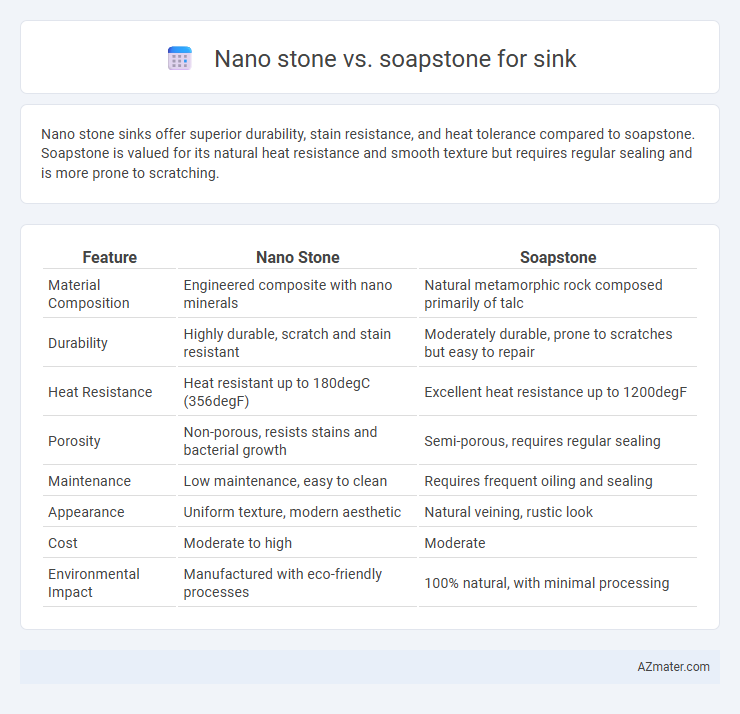Nano stone sinks offer superior durability, stain resistance, and heat tolerance compared to soapstone. Soapstone is valued for its natural heat resistance and smooth texture but requires regular sealing and is more prone to scratching.
Table of Comparison
| Feature | Nano Stone | Soapstone |
|---|---|---|
| Material Composition | Engineered composite with nano minerals | Natural metamorphic rock composed primarily of talc |
| Durability | Highly durable, scratch and stain resistant | Moderately durable, prone to scratches but easy to repair |
| Heat Resistance | Heat resistant up to 180degC (356degF) | Excellent heat resistance up to 1200degF |
| Porosity | Non-porous, resists stains and bacterial growth | Semi-porous, requires regular sealing |
| Maintenance | Low maintenance, easy to clean | Requires frequent oiling and sealing |
| Appearance | Uniform texture, modern aesthetic | Natural veining, rustic look |
| Cost | Moderate to high | Moderate |
| Environmental Impact | Manufactured with eco-friendly processes | 100% natural, with minimal processing |
Introduction to Nano Stone and Soapstone Sinks
Nano stone sinks offer exceptional durability and stain resistance due to their advanced composite materials, making them ideal for modern kitchens. Soapstone sinks, crafted from natural talc-rich stone, provide a smooth, heat-resistant surface that develops a unique patina over time, enhancing their aesthetic appeal. Both materials deliver longevity and style but differ significantly in maintenance requirements and visual character.
Material Composition: Nano Stone vs Soapstone
Nano stone sinks are engineered from a composite blend of natural minerals and resin, offering enhanced durability, resistance to scratches, and non-porous surfaces that prevent staining. Soapstone sinks, composed primarily of talc and other minerals, are naturally dense and heat-resistant but require regular oiling to maintain their appearance and are more prone to scratching over time. The synthetic composition of nano stone provides superior hardness and ease of maintenance compared to the softer, more porous nature of traditional soapstone.
Durability and Strength Comparison
Nano stone sinks exhibit exceptional durability due to their engineered composition, which combines natural quartz with resin, resulting in high resistance to scratches, heat, and stains. Soapstone sinks are naturally dense and strong, offering excellent resistance to heat and chemicals, but they are softer and more prone to surface scratches and dents over time. In terms of long-term strength, nano stone provides superior hardness and less maintenance, while soapstone requires periodic sealing to maintain its durability.
Resistance to Stains and Scratches
Nano stone sinks exhibit superior resistance to stains and scratches due to their dense, non-porous surface, making them highly durable in busy kitchens. Soapstone, while naturally resistant to stains because of its low porosity, is softer and more prone to scratches and denting, requiring regular maintenance for preservation. Choosing nano stone ensures enhanced longevity and ease of cleaning, whereas soapstone offers a more rustic appearance but demands careful handling to avoid surface damage.
Aesthetic Appeal and Color Options
Nano stone sinks offer a sleek, modern aesthetic with a uniform, polished surface that enhances contemporary kitchen designs, whereas soapstone sinks present a more natural, rustic look featuring subtle variations and a matte finish. Soapstone is prized for its rich, deep hues ranging from dark gray to greenish tones, developing a unique patina over time, while nano stone sinks provide consistent color options including whites, blacks, and greys that resist staining. Both materials allow customization, but soapstone's organic texture appeals to those seeking warmth and natural beauty, contrasting with the sophisticated, minimalistic appearance of nano stone.
Maintenance and Cleaning Requirements
Nano stone sinks require minimal maintenance due to their non-porous surface, which resists stains, bacteria, and water absorption, allowing for easy cleaning with mild soap and water. Soapstone sinks, while naturally resistant to acids and heat, demand regular oiling to maintain their dark, smooth appearance and prevent drying or chalking over time. Both materials withstand everyday cleaning well, but nano stone offers a more hassle-free, low-maintenance option compared to the periodic upkeep soapstone requires.
Environmental Impact and Sustainability
Nano stone sinks offer a more sustainable option due to their use of natural minerals bonded with eco-friendly resins, resulting in lower carbon emissions during manufacturing compared to soapstone. Soapstone, a natural metamorphic rock, is prized for durability but requires extensive quarrying that can disrupt ecosystems and consumes significant energy. Choosing nano stone supports reduced environmental impact through innovative production techniques, while soapstone requires careful sourcing to ensure sustainability.
Installation Process and Cost
Nano stone sinks offer a seamless, lightweight installation process due to their engineered composite structure, typically requiring less labor and time compared to soapstone sinks. Soapstone sinks, made from natural stone, often demand professional installation with heavier support systems, increasing labor intensity and installation duration. While nano stone sinks generally cost between $300 and $700, soapstone sinks range from $500 to $1,200, with higher installation costs due to their weight and complexity.
Suitability for Kitchen and Bathroom Sinks
Nano stone offers exceptional durability and non-porous surface qualities, making it highly resistant to stains and scratches, ideal for both kitchen and bathroom sinks. Soapstone's natural heat resistance and chemical inertness suit bathroom sinks well, but its softer texture requires regular maintenance to prevent dents and scratches in high-traffic kitchen environments. The choice depends on balancing Nano stone's low-maintenance toughness with soapstone's classic aesthetic and thermal properties.
Final Verdict: Which Sink Material is Best for You?
Nano stone sinks offer superior durability and scratch resistance with a modern, polished look, making them ideal for busy kitchens that require low maintenance. Soapstone sinks provide natural heat resistance and a unique, rustic aesthetic that ages beautifully over time but may require occasional oiling to maintain its luster. Choosing between nano stone and soapstone depends on your preference for durability and contemporary style versus natural beauty and traditional charm.

Infographic: Nano stone vs Soapstone for Sink
 azmater.com
azmater.com